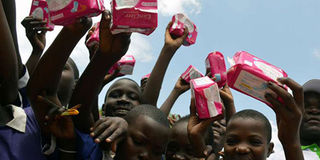Social support key in boosting reproductive health knowledge

Pupils of Ombeyi Primary School in Kisumu are overjoyed after receiving sanitary towels on July 21, 2018. The availability of sanitary towels helps keep girls in school. PHOTO | FILE | NATION MEDIA GROUP
In September, the Daily Nation reported that a 14-year-old girl from Bomet County had committed suicide after she was period-shamed by her teacher. So shocking was the story that it quickly found its way to international media outlets.
Days after the suicide, a Teachers Service Commission (TSC) report revealed that the school where the girl studied had 72 packets of sanitary pads stored for use.
The death of Jaqueline raised many questions. Why was she not able to access sanitary towels to manage her flow? How are young adolescent girls dealing with menstruation? Do young girls have adequate information and resources to handle their menses?
During puberty, both girls and boys go through hormonal, emotional, social and physical changes, all in different forms. While the changes are normal age-related transitions, it is notably unfortunate that they tend to be more intense on girls compared with their male counterparts.
According to WebMD, a health information website, girls start experiencing the monthly menstrual flow, which can last between three and seven days. During this period, they become more conscious of how they smell and of the flow.
For first-timers, this can be a very challenging and confusing moment. Ideally, during the menstrual period, girls are to stay clean and change sanitary towels frequently. In reality, though, not all girls are able to stay clean and even worse, not all girls have access to sanitary towels. Some girls also have limited knowledge on what to do or how to handle menses.
In 2017, the research organisation Population Council, in partnership with ZanaAfrica, a leading Kenyan social impact organisation that supports adolescent girls, launched the Nia Project, a seminal research study to analyse the individual and combined effects of sanitary pads and comprehensive reproductive health education on girls’ health, social, and education outcomes.
The Nia Project (Nia is Swahili for purpose) was conducted in Kilifi County among 3,500 Standard Seven girls between 10 and 21 years. The sampled girls had high educational aspirations despite low levels of parental education.
At baseline, the Nia Project revealed that 79 per cent of girls sampled did not have enough materials to manage their menstruation comfortably. The research also showed that 20 per cent of the girls used old pieces of cloth as a substitute to sanitary towels.
The research further revealed that 83 per cent found it important to keep their menses a secret, with 67 per cent being uncomfortable in their bodies during their menses — which speaks to the need for comprehensive menstrual and reproductive health education.
In 2011, the Kenyan government, through the Ministry of Education, Science and Technology, initiated the Schools’ National Sanitary Towels programme to increase girls’ school attendance and participation.
The programme, which includes providing sanitary pads to schoolgirls and the training of teachers on hygienic usage and disposal of pads, is enhanced every year, with a budget set a side every fiscal year.
However, the Nia Project indicated that some schools received inadequate supplies to meet the needs of all female students throughout the year, with only 54 per cent of girls benefiting.
The Nia Project research study revelations are not an isolated case. A study conducted by Reproductive Health (RH) in western Kenya in 2011 disclosed that some families cannot prioritise buying sanitary pads over other basic needs due to the poverty levels in the research region.
This pushes the girls to seek improvised means to prevent leakage. The study highlighted the use of alternatives such as clothes, blankets and mattress pieces to manage menstrual flow.
A similar study by FSG and sponsored by the Bill and Melinda Gates Foundation indicated that inequitable gender dynamics become pronounced during puberty.
The study showed that some adolescent girls and young women are unable to negotiate access to vital healthcare services and products.
The research suggested that it is common for girls in Kenya to engage in transactional sex or seek out boyfriends to obtain goods that meet their basic needs, including sanitary pads.
According to Dr Beth Kangwana, a lead researcher at Population Council, period-shaming is real and a case like Jacqline’s could have been avoided had she received the necessary social support at school from her teachers and peers and if she had proper access to sanitary pads and comprehensive knowledge and confidence on puberty and sexual health.




